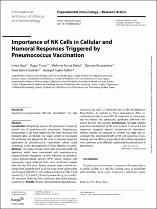| dc.contributor.author | Gazi, Umut | |
| dc.contributor.author | Tosun, Özgür | |
| dc.contributor.author | Derici, Mehmet Kürşat | |
| dc.contributor.author | Karasartova, Djursun | |
| dc.contributor.author | Güreser, Ayşe Semra | |
| dc.contributor.author | Taylan Özkan, Hikmet Ayşegül | |
| dc.date.accessioned | 2024-01-26T06:26:35Z | |
| dc.date.available | 2024-01-26T06:26:35Z | |
| dc.date.issued | 2023 | en_US |
| dc.identifier.citation | Gazi, U., Tosun, O., Derici, K., Karasartova, D., & Gureser, S. (2023). Importance of NK Cells in Cellular and Humoral Responses Triggered by Pneumococcus Vaccination. International Archives of Allergy and Immunology, 1-8. | en_US |
| dc.identifier.issn | 1018-2438 | |
| dc.identifier.issn | 1423-0097 | |
| dc.identifier.uri | https://doi.org/10.1159/000535562 | |
| dc.identifier.uri | https://hdl.handle.net/11491/8746 | |
| dc.description.abstract | Introduction: Despite the success of vaccination in reducing overall rate of pneumococcal pneumonia, Streptococcus pneumoniae is still held responsible for high mortality and modality rates worldwide. Our study aimed to investigate the potential role played by NK cells in immune response generated by pneumococcal vaccination, which could contribute to the development of more effective vaccines. Methods: The study included mice with and without NK cell depletion which were immunized with pneumococcus polysaccharide-conjugated vaccine followed by pneumococcus polysaccharide vaccine (PPV). Serum samples and splenocytes were collected from mice sacrificed 4 weeks after the last PPV dose. Serum samples were used for antibody level quantification by ELISA assay, while splenocytes were treated with PPV in vitro before monitoring CD4+ T-cell subsets (TH1, TH2, and TH17) and cytokine (IFN-γ, IL-4, and IL-17) secretion levels by flow cytometry and ELISA analysis, respectively. Results: Results demonstrated reduced pneumococcal IgG and TH1 cell levels due to NK cell depletion. Nevertheless, in contrast to these observations, IFN-γ secretion levels after in vitro PPV-23 treatment of splenocytes did not exhibit any statistically significant difference between the two mice groups. Conclusions: The data indicate a positive contribution of NK cells to both T-cell and B-cell responses triggered against pneumococcal vaccination. Further studies are required to confirm our data and investigate the potential benefit of NK cell targeting in promoting vaccine efficacy, especially in the elderly population who continues to be affected significantly by pneumococcal pneumonia. | en_US |
| dc.language.iso | eng | en_US |
| dc.publisher | KARGER | en_US |
| dc.relation.ispartof | International Archives of Allergy and Immunology | en_US |
| dc.rights | info:eu-repo/semantics/openAccess | en_US |
| dc.subject | Streptococcus pneumoniae | en_US |
| dc.subject | NK cells | en_US |
| dc.subject | Vaccination | en_US |
| dc.subject | TH1 | en_US |
| dc.subject | IgG | en_US |
| dc.title | Importance of NK Cells in Cellular and Humoral Responses Triggered by Pneumococcus Vaccination | en_US |
| dc.type | article | en_US |
| dc.department | Hitit Üniversitesi, Tıp Fakültesi, Temel Tıp Bilimleri Bölümü | en_US |
| dc.relation.publicationcategory | Makale - Uluslararası Hakemli Dergi - Kurum Öğretim Elemanı | en_US |
| dc.contributor.institutionauthor | Karasartova, Djursun | |
| dc.contributor.institutionauthor | Güreser, Ayşe Semra | |
| dc.identifier.doi | 10.1159/000535562 | en_US |
| dc.description.wosquality | Q3 | en_US |
| dc.description.wospublicationid | WOS:001133513100001 | en_US |
| dc.description.pubmedpublicationid | 38151005 | en_US |


















